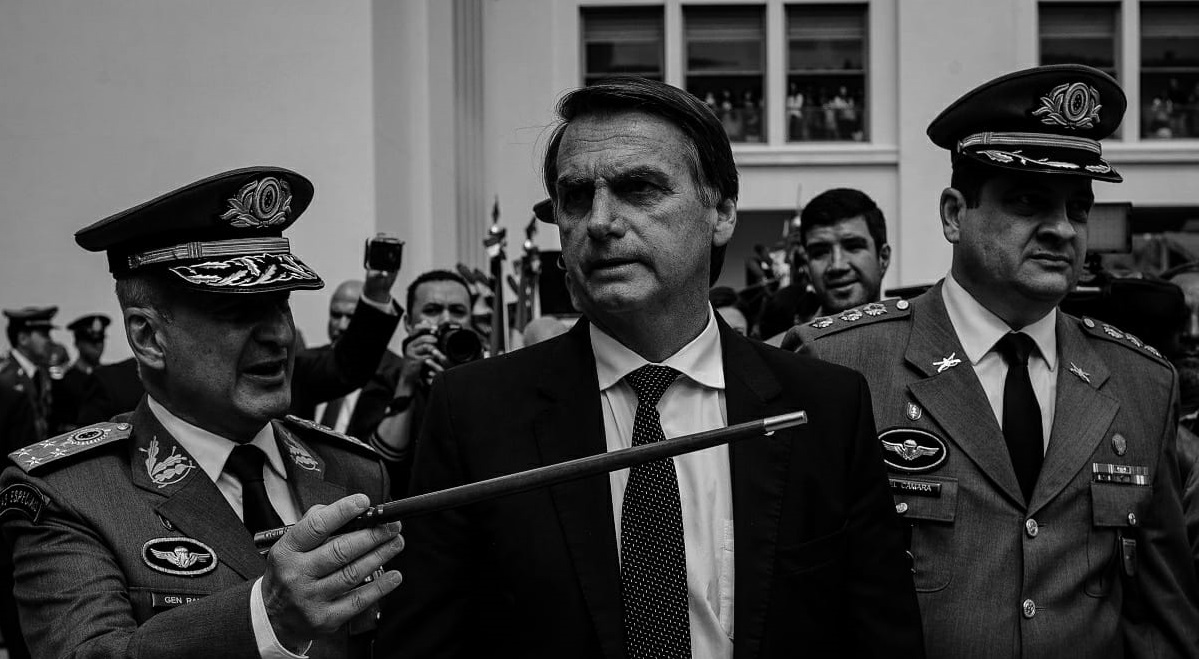As fascist mob violence against gays and leftists increases, 3 generals whose careers were forged during the Military Dictatorship are helping the Brazilian far-right candidate design an ultra-neoliberal governmental platform
by Rafael Tatemoto*
Brazilian army officers have been playing an increasing role the building of far-right presidential candidate Jair Bolsonaro’s platform. Three generals are now working on his economic and infrastructure plans: Oswaldo Ferreira, Augusto Heleno, and Aléssio Ribeiro Souto.
Having the three military Generals engaged in Bolsonaro’s program for government means they share the same views as his most important economic adviser, Paulo Guedes. The ultra neoliberal guru is being investigated by Brazilian authorities over accusations of engaging in a R$1 billion ($268 billion USD) pension fund investment fraud, at the same time that he is reportedly in charge of all important elements of Bolsonaro’s program, including controversial proposals such as setting a flat, 20-percent income tax rate, which would reduce taxes on the rich and significantly increase them on the poor.
While Guedes operates in Rio de Janeiro, the military group is working in Brasília. All three generals have a common influence: General Golbery do Couto e Silva, a key actor in the 1964 Military Coup. Research papers produced by the three Generals at the Brazilian Army Command School show how their views about geopolitics have been influenced by the Golbery’s national security doctrine, which was based on the idea of a “domestic enemy” that has to be eliminated. The following is an introduction to each of the three Generals who are now working with Bolsonaro.
Augusto Heleno Ribeiro Pereira
Bolsonaro’s first option for a running mate, he ultimately did not run for vice president because his party, the Progressive Republican Party (PRP) did not formally enter in coalition with the presidential candidate’s Social Liberal Party (PSL). The former Brazilian operation commander in Haiti, he also wields major influence in the candidate’s public security plan, standing for topics such as lowering the nation’s age of criminal consent. But the general is playing down the role of Bolsonaro’s government program, arguing it is “nothing but a protocol of intentions.” “It does not make sense while you don’t have an appointed minister. The programs will really be created during the two months between the election [on Oct. 28] and the inauguration, in January,” he said.
Oswaldo Ferreira
Ferreira is slated as Bolsonaro’s probable Transportation Minister and stands out as the primary military officer for infrastructure projects. He advocates the relaxing of environmental regulations during public works and, in synch with Bolsonaro’s platform, supports eliminating the Ministry of Environment and moving its operations to the Ministry of Agriculture, which has been historically controlled by the agribusiness lobby. He once said that, back in his day, “there were no public prosecutor’s offices or environmental protection agencies to bust our balls,” during highway construction projects in the Amazon during the military dictatorship.
Aléssio Ribeiro Souto
He specialized in technology during his studies at the Brazilian military academy and ran the Army Technology Center between 2006 and 2009. When it comes to education policies, he says teachers’ pay is not a priority: “There are several aspects regarding the appreciation of teachers. The fifth or sixth is the wage issue,” he said. Souto argues that the ousting of João Goulart was not a military coup and that “books that don’t tell the truth about the 1964 regime have to be eliminated.”
Edited by Tayguara Ribeiro
*This article was originally published in Brasil de Fato, and was further edited slightly by Brasil Wire for readability. The original article can be seen here.
[qpp]

